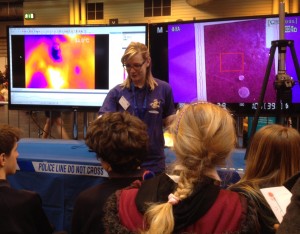Superidentity causing a Big Bang
Dr Sarah Stevenage, Associate Dean for Education & Student Experience (Strategy & Innovation), is part of a team bringing the concept of Superidentity to thousands of children at The Big Bang Fair 2015.
We are approaching a rare constellation of events – International Women’s Day, National Science Week (formerly National Science and Engineering Week), and the UK’s biggest outreach event in the calendar – the Big Bang Fair. All three events fall in the month of March, and I wanted to take this opportunity to tell you a little bit about my work as it fits within all three events.
As an academic in Psychology at the University of Southampton, I am involved in a number of research activities. However, the biggest of these is the SuperIdentity project (www.southampton.ac.uk/superidentity). This is a collective endeavour across six UK universities, and seven disciplines.
My job is to lead this project and, whilst it has brought its challenges, it has been an immensely interesting piece of work to be involved in. Now, I can hear you asking – what is the SuperIdentity project all about? In essence, we are interested in all the identity cues that make up who you are.
Within our modern world though, we know that those identity cues exist online as much as they do offline. We also know that those online cues might paint quite a different picture of you compared to your offline cues. Our task has been to try to figure out how the degree to which your online and offline identities might nevertheless be linked to one another because – and here comes the punchline – because all cues relate back to you – the source – the superidentity.
We’ve been working hard using methods that span forensic anthropology, automated recognition, biometrics, and human cognitive capacities in handling complex volumes of information. All of these help us clarify your identity in the real world, and they give us clues as to what might define your identity online. We like the term ‘cybermetrics’ to describe your online identity cues.
Alongside all this work on cues to identity, we have also worked hard to find out how people feel about their identity, and about their privacy. This has been incredibly important for us because, while our project has been running, various EU law reforms have come into force regarding data protection and privacy. We have been really careful not to ignore this.
As a result of all our work, we have a much more modern understanding of identity now, and this may help in instances such as missing persons investigations, and when teaching young people about staying streetwise online.
Talking of our young people and superidentity, we are thrilled to be hosting a series of workshops at the Big Bang Fair at the Birmingham NEC from 11-14 March (www.thebigbangfair.co.uk). Our workshops invite you to come and join the identity detectives for a day, during which we share some of the new and cool ways of revealing identity. You can find out more about our Big Bang workshops via our own website (www.southampton.ac.uk/theidentitydetectives) or, if you are in the area, come and find us in the Alive Zone.

It’s no coincidence to us that the Big Bang Fair runs at the same time as National Science Week. Both events are devoted to sharing the brilliant work that goes on at universities in STEM subjects (science, technology, engineering and maths), and both aim to attract as many girls as boys into these subjects.
It’s fitting that International Women’s Day falls in March too. At a personal level, I have loved the opportunity to push barriers of understanding in my field of science, and to bubble over with enthusiasm when telling others about our discoveries.
I’ve also loved working at the junctions between sciences – using biology, mathematics, modelling, statistics, and human creativity, to solve a shared problem. In this sense, ‘I love it when a plan comes together’. In the SuperIdentity Project, it really has.

Leave a Reply
You must be logged in to post a comment.